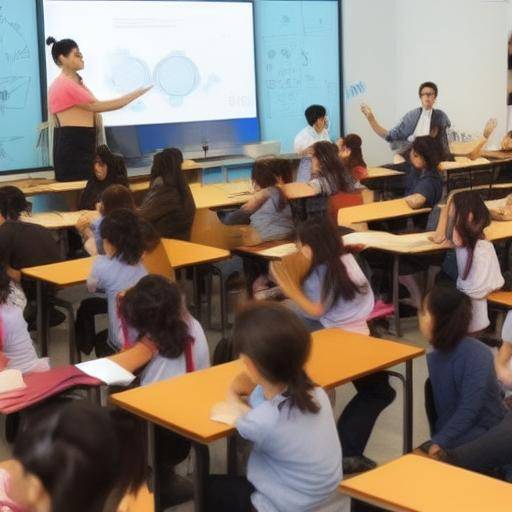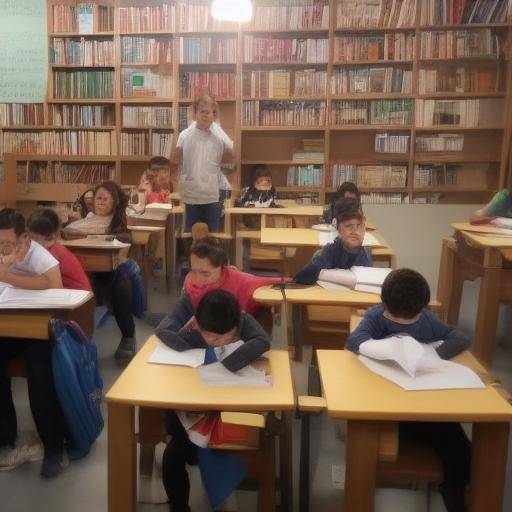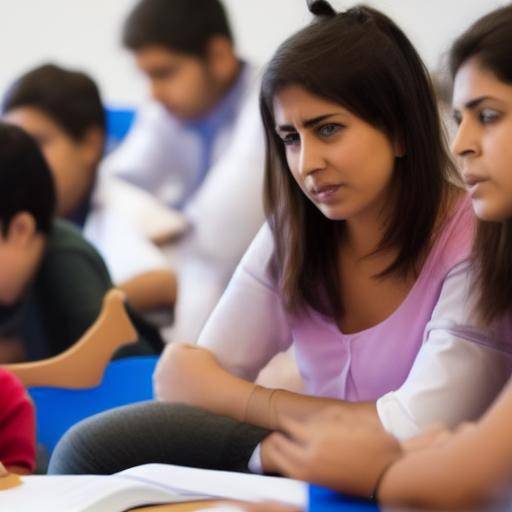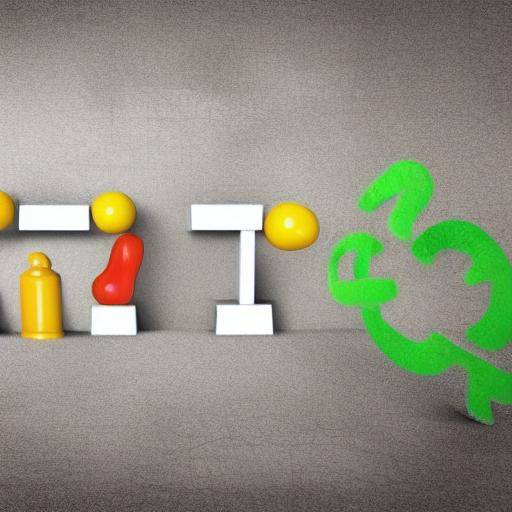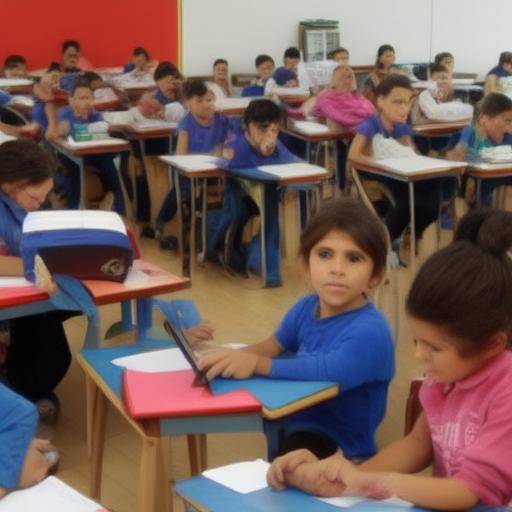
Positive feedback on education is a fundamental aspect that significantly influences the academic development of students. In today ' s world, its importance is increasingly recognized in the teaching and learning process. Through this article, we will explore in detail the relevance of positive feedback in education, its benefits, challenges, current trends and its impact on academic development.
Introduction
Education is a fundamental pillar in the formation of individuals capable of contributing significantly to society. Within this context, positive feedback plays a vital role in optimizing the educational process. It is therefore crucial to understand how this practice influences student academic development.
Throughout this article, we will explore the importance of positive feedback on education from a historical, analytical and practical perspective. We will also provide practical advice, innovative ideas and opinions from educational experts.
History and Background
Positive feedback on education has deep historical roots that go back to ancient civilizations. From classical Greece to the first educational institutions, feedback has been an essential component in the teaching and learning process. In more recent times, it has experienced significant development with the incorporation of new teaching methodologies and progress in educational psychology.
Learning and Development Throughout History
From the teaching methods of ancient civilizations to modern educational systems, feedback has been instrumental in guiding learning and fostering academic development. Throughout history, educational leaders, philosophers and psychologists have contributed to the evolution of positive feedback in education.
The emergence of significant pedagogical theories, such as the proposals by thinkers such as Jean Piaget and Lev Vygotsky, has enriched the understanding of how students assimilate and process feedback. This has led to a more personalized and effective approach to providing positive feedback in the educational environment.
Significant Milestones in the Evolution of Positive Feedback
The development of educational technologies, the integration of intercultural approaches in education and the emphasis on feedback on active learning have marked significant milestones in the evolution of positive feedback on education. These advances have transformed the way educators provide feedback and how students incorporate it into their learning processes.
Detailed Analysis
Positive feedback on education entails numerous benefits that directly influence students' academic development. In addition, it faces challenges that require innovative approaches to maximize its effectiveness. Through a detailed analysis, we will explore these key aspects and provide an integral view of feedback in the educational environment.
Benefits and Challenges of Positive Feedback
Positive feedback, when properly managed, can act as a powerful motivator for students, foster a positive learning environment and provide effective guidance to improve academic performance. However, the challenge lies in the proper management of feedback to ensure that it is constructive, meaningful and personalized for each student.
Current trends in positive feedback highlight the importance of continuous training feedback, the implementation of innovative educational technologies and the promotion of inclusive approaches that address the individual needs of students. These approaches are demonstrating a significant impact on the academic and personal development of students.
Comprehensive review
To fully understand the relevance of positive feedback in education, it is crucial to explore its practical application, actual case studies and best practices in the field of education. In addition, it will be enriching to analyze the perspectives of experts and obtain a prospective view of how positive feedback can continue to evolve to enhance academic development.
Applications, Case Studies and Best Practices in Education
Effective feedback on education goes beyond simple comments on academic performance. It understands the art of offering personalized guidance that motivates students to reach their maximum potential. By exploring real cases of study, as well as best practices applied in different educational environments, we can visualize how positive feedback has transformed students' learning and academic development.
Education experts, including pedagogues, educational psychologists and educational technology specialists, offer valuable insights into best practices to provide positive feedback. Their views and case studies will provide a deeper understanding of how effective feedback can positively impact academic development, especially in a constantly evolving world.
Comparative analysis
By comparing education, positive feedback and academic development, we can identify similarities, differences and possible synergies between these interrelated elements. This analysis will allow us to understand how positive feedback influences academic development, how it aligns with educational objectives and how it can be optimized to maximize their impact on student learning and growth.
Practical Tips and Accessible Advice
Providing practical guidance and actionable advice is essential to empower educators and students to effectively implement positive feedback in the educational context. By providing clear advice and practical tools, this article seeks to facilitate the successful implementation of positive feedback, thus promoting an enriching learning environment and sound academic development.
Industry Perspectives and Expert Reviews
Exploring the perspectives of experts in the educational industry provides a privileged view of emerging trends, challenges and opportunities in relation to positive feedback and its impact on academic development. The compilation of expert opinions and the presentation of current key trends will enable readers to understand in a comprehensive manner the educational landscape in constant transformation.
Cases of Study and Practical Applications in Real Life
The detailed analysis of case studies and practical applications of positive feedback in various educational environments will provide concrete examples of their impact on the academic development of students. These illustrative examples will show how positive feedback has been successfully implemented to catalyze students' significant growth and learning in different educational contexts.
Future Trends and Predictions
Exploring future trends related to education, positive feedback and academic development will provide an informed view of the path that is drawing the educational field. This prospective analysis will allow readers to understand how positive feedback will continue to evolve and how it can significantly impact academic development in the future.
Conclusions and FAQs
Conclusions
Positive feedback on education is a valuable resource that promotes the academic development of students. Throughout this article, we have explored in depth the importance of positive feedback, from its historical roots to its role in current education. In considering future benefits, challenges, practical applications and trends, it is clear that positive feedback is a crucial component in academic development.
Frequently asked questions
1. What is the difference between positive and negative feedback in education?
Positive feedback focuses on highlighting the positive aspects of student performance to motivate academic development, while negative feedback focuses on correcting mistakes or deficiencies.
2. How can positive feedback impact student academic development?
Positive feedback can increase student self-esteem, motivation and confidence, which contributes to better academic performance and personal development.
3. What are the best practices to provide positive feedback on distance education?
In distance education, it is crucial to use efficient technological tools, create opportunities for student interaction and customize feedback to address the individual needs of students.
4. How can educators overcome the challenges by implementing positive feedback in diverse educational settings?
Educators can overcome these challenges by developing effective communication skills, fostering a trusted environment and adapting feedback to the diverse cultural and linguistic needs of students.
5. What is the role of parents in the process of positive feedback in education?
Parents can support positive feedback by strengthening at home and working closely with educators to strengthen positive feedback within and outside the school environment.
6. What are future trends in positive feedback on education?
Future trends include the use of artificial intelligence to customize feedback, the integration of socio-emotional approaches and the expansion of feedback in hybrid learning environments.
In short, positive feedback on education is a valuable resource that influences the academic development of students. From its historical evolution to its practical application and future trends, positive feedback plays a key role in the meaningful learning and personal growth of students. This article aims to provide an integral and insightful vision that promotes the effective understanding and implementation of positive feedback in the educational field.












